新概念英语1Lesson85
新概念英语第一册85课(课堂PPT)

the spring本课是特指巴黎
的一个春天,所以加了定冠
词 the。
17
What’s on? 这里的be on是“上演”的意思
有一个新电影正上演。 A new film is now on. 今天晚上电视上有什么节目? What’s on television tonight?
18
I’ve already seen it.
(A )5.A: Did you read the book last night?
B:No, I____it three times.
A. have read B. was reading C. have readed D. reade5d
I. Revision:
Now let's do some exercises:
We go to the_c_i_n_e_m_a__to see a film. We go to the__th_e_a_t_re__to see a play8 .
Lesson 85 Paris in thespring
New words and expressions:
★ film n.
(1)(c)n.电影
否定式: 主语 + haven't/hasn't + 过去分词 + 其他。 疑问式: Have /Has + 主语 + 过去分词 + 其他? 简略答语: Yes, 主语 + have/has.(肯定)
No, 主语 + haven't/hasn't.(否定)
(3)一般现在完成时通常与表示不确定的时间副词或短语连用 如 just, already, before, never, ever, twice, three times 等。 (4)现在完成时在汉语中常用“了”、“过”或“已经”来表示。
(完整版)新概念英语第一册lesson85-86重点解析
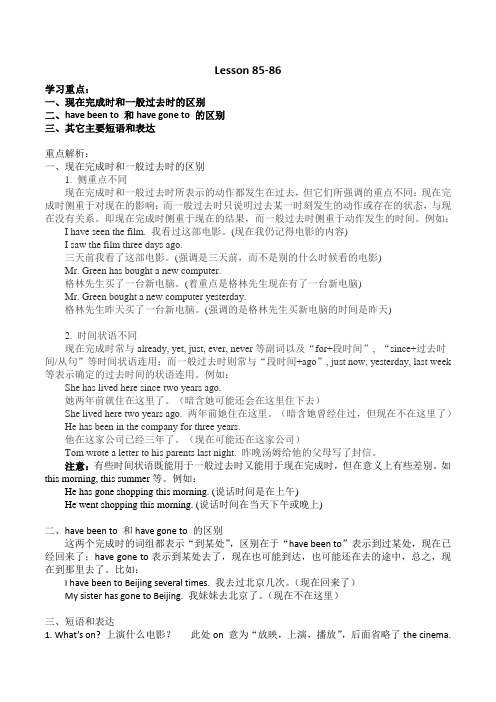
Lesson 85-86学习重点:一、现在完成时和一般过去时的区别二、have been to 和have gone to 的区别三、其它主要短语和表达重点解析:一、现在完成时和一般过去时的区别1. 侧重点不同现在完成时和一般过去时所表示的动作都发生在过去,但它们所强调的重点不同:现在完成时侧重于对现在的影响;而一般过去时只说明过去某一时刻发生的动作或存在的状态,与现在没有关系。
即现在完成时侧重于现在的结果,而一般过去时侧重于动作发生的时间。
例如:I have seen the film. 我看过这部电影。
(现在我仍记得电影的内容)I saw the film three days ago.三天前我看了这部电影。
(强调是三天前,而不是别的什么时候看的电影)Mr. Green has bought a new computer.格林先生买了一台新电脑。
(着重点是格林先生现在有了一台新电脑)Mr. Green bought a new computer yesterday.格林先生昨天买了一台新电脑。
(强调的是格林先生买新电脑的时间是昨天)2. 时间状语不同现在完成时常与already, yet, just, ever, never等副词以及“for+段时间”, “since+过去时间/从句”等时间状语连用;而一般过去时则常与“段时间+ago”, just now, yesterday, last week 等表示确定的过去时间的状语连用。
例如:She has lived here since two years ago.她两年前就住在这里了。
(暗含她可能还会在这里住下去)She lived here two years ago. 两年前她住在这里。
(暗含她曾经住过,但现在不在这里了)He has been in the company for three years.他在这家公司已经三年了。
(现在可能还在这家公司)Tom wrote a letter to his parents last night. 昨晚汤姆给他的父母写了封信。
新概念第一册lesson85-86 Paris in the spring幻灯片课件

Have you just been to the cinema? 你刚刚去过电影院吗? 这是一个现在完成时态的一般疑问句。
just : 刚刚,刚才,现在完成时态的标志 词之一
Have you just been to the cinema? 把这句话变为肯定句: I have just been to the cinema. 你刚刚去了电影院。
I was there last month. I went to Paris last year.
现在完成 时
过去发生的 事对现在的 影响,或从 过去一直持 续到现在的 动作或状态
have/has +过去分词
already, just (肯定句中); never(肯定句 中表否定); ever(疑问句中)
Lesson 85-86 Paris in the spring
1. PCahreicsk /'pæ ris/ n. P巴hon黎etics
2. cinema /'sinimə/ n. 电影院
3. film /film/ n. 电影
4. beautiful /'bjVuo:ctaibfuulal/ry adj. 漂亮的
• Yes,he did.
• 4.At At what time of year did Ken visit Paris?
• He was there in April.
• 5.What’ s the weather like in Paris in spring?
• The weather was awful.
I have already read this book. I read it yesterday. It’s an old book, but it’s interesting.
新概念英语成人版第一册Lesson85-86导学案含答案

Lesson 85 ~ 86 Paris in the spring◆词汇详解(1) Paris n. 巴黎巴黎圣母院凡尔赛宫凯旋门卢浮宫塞纳河畔‘Paris in the Spring’:电影《巴黎之春》(2) cinema n. 电影院近义词:____________去看电影____________________________(3) film n. 电影同义词:______________(4) beautiful adj. 漂亮的e.g. 她是个漂亮的女孩儿。
___________________________________________.e.g. Beautiful weather, isn't it?_____________________,对吗?(5) city n. 城市扩展:国家___________ / 村庄___________ / 城镇_________ / province省(6) never adv. 从来没有e.g. -- I’m sorry. I forgot my homework.-- Never mind. ____________。
✍试一试:他周末从来不早起。
____________________________________________.I have never been to France. __________________________________。
(7) ever adv. 在任何时候ever常用于否定句、疑问句以及表示条件的从句中表示“以往任何时候”、“曾经”、“在任何时候”、“从来”这类意思,用在句中通常有________之意。
e.g. 你(曾经)去过北京吗?_______________________________________________________?(1) Have you just been to the cinema?●复习回顾前面83课我们学到的现在完成时。
新概念英语第一册第85-86课课件 (共26张PPT)
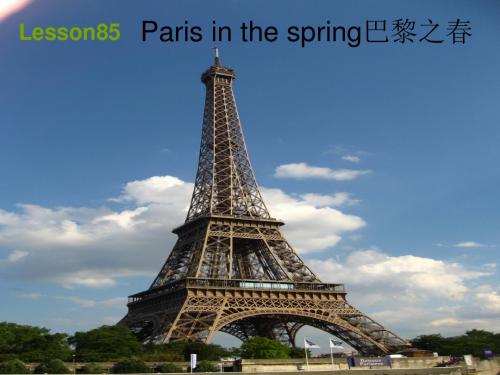
cinema n.电影院 We are going to the cinema tomorrow. 明天我们打算去电影院。
theatre 剧院,戏院
a film star 电影明星/watch/see the film 看电影
例如: We go to the________to see a film. We go to the________to see a play.
film
cinema
new words Paris n. 巴黎
cinema n.电影院
film
n.电影
beautiful adj.漂亮的
city
n城市
never adv.从来没有
ever adv.在任何时候
Paris 巴黎(法国首都)
London 伦敦 (英国首都)
Tokyo 东京 (日本首都)
中表示“以往任何时候”、“曾经”、“在任何 时候”、“从来”这类的意思。
have been to a place与have gone to a place 的区别
have been to: 表示曾经去过某 地,但现在不在 那了,去而已归, 人现在在哪里不 知道。
have gone to: 表示已经去某 地了,现在在 那个地方或正 在去的路上, 去而未归。
Homework
1. To finish the exercises after the text. 2. To practise the structures learned during the class.
A new film is now on. 今天晚上电视上有什么节目?
What’s on television tonight?
新概念英语第一册85课

活到老,学到老。 One is never too old to learn.
Lesson 85 Paris in the spring
George: Hollo, Ken.
Ken:
Hi, George.
George: Have just been to the cinema?
Ken: Yes, I have.
It rained all the time.
all the time 一直,始终
George: Just like London!
就
介词“像”
Just like London! = The weather in Paris in spring is just like the weather in London in spring. 这里的just是“就、正好、恰恰”的意思。 【比较上文】 这里的like是“像”的意思。 酒店就像家一样。 The hotel is just like home. 夏威夷就像天堂一样。 Hawai is just like heaven.
Lesson 85 Pairs in the spring
GEORGE: Hello, Ken. KEN: Hi, Georen. GEORGE : Haveyou just been to the cinema? KEN: Yes, I have. GEORGE : What’s on? KEN: “Paris in the Spring”. GEORGE: Oh, I’ve already seen it. I saw it on television last year. It’s an old film, but it's very good. KEN: Paris is a beautiful city. GEORGE: I've never been there.Have you ever been there,Ken? KEN: Yes, I have.I was there in April. GEORGE: Paris in the spring,eh? KEN:It was spring,but the weather was awful.It rained all the time . GEORGE: Just like London!
新概念一Lesson85-86讲解与习题

Lesson85—86I. Phrases1.Have been to。
2.What’s on?3.Have been there4.In April5.All the time6.Just likeII. Grammar1.现在完成时和一般过去时:在英语中,现在完成时主要用于以下两种情况:或者表示在过去不确定的时间里发生的并与现在有着某种联系的动作;或者表示开始于过去并持续到现在的动作.一般过去时表示发生在过去的一个动作或状态。
e.g. I have already had lunch。
/ I ate lunch。
牛刀小试:模仿例句完成以下句子。
1.I have already listened to the news. I listened to it at two o’clock。
(listen)2.She __________________your letters. She ___________ them an hour ago(type).3.They __________________their shoes. They ___________ them this morning(clean).4.Mum _________________a meal. She ________it at 6 o'clock。
(cook)新概念一Lesson85-86测试题I。
默写单词1。
巴黎__________ 2. 电影院__________ 3。
电影__________4. 漂亮的__________5. 城市__________ 6。
从来没有__________7。
在任何时候__________II。
写出下列动词的过去式和过去分词。
1.buy _________ _________2.do _________ _________3.have _________ _________4.see _________ _________5.open _________ _________6.air _________ _________7.ask_________ _________8.put_________ _________9.go_________ _________10.be_________ _________III. 按要求改写句子1.I have just been to the cinema. (改为一般疑问句并作肯定回答)2.She has already had her lunch。
新概念英语第一册lesson85-86
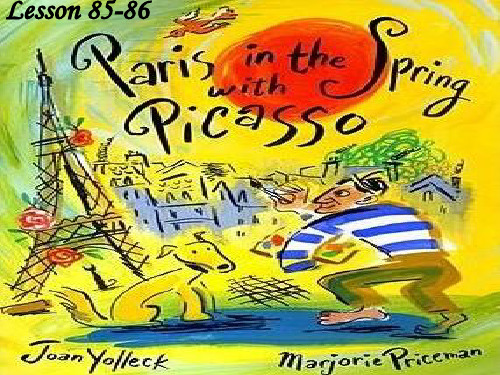
Triumphal Arch Arc de triomphe de l'Étoile
7
Notre Dame de Paris
8
cinema / movie theatre
9
What is your favorite film? Why?
10
Paris is a romantic __c_it_y___.
13
cinema n.电影院 words
We are going to the cinema tomorrow.(movie theater<美语>电影院) 明天我们打算去电影院。
film n.电影
a film star 电影明星/watch/see the film 看电 影
film n.胶卷,底片
Lesson 85-86
1
Revision
Unscramble the letters to make words
• sems • akcp
→ mess → pack
• uisctase → suitcase
• vaele → leave
• realday → already
• veha
→ have
与同义词的区别
beautiful表示接近和谐理想的美 pretty表示可爱,令人怜爱 good-looking 指容貌美 handsome指容貌端正英俊的(多指男子)15
city
a large city 大都市
What is the largest city in China? 中国最大的城市什么?
• sha
→ has
• jstu
→ just
• adh
新概念英语第一课 Lesson 85-86

NCE Lesson 85-86课文详解1.I've never been there. 我从未去过。
never 表示“从无”、“从未”,在这里有强调之意。
2.Have you ever been there, Ken? 肯,你去过吗?ever常用于否定句、疑问句以及表示条件的从句中表示“以往任何时候”、“曾经”、“在任何时候”、“从来”这类意思。
用在此句中也有强调之意。
3.What’s on ? 上映什么片子?be on 上演,放映,on为形容词,表示事物正在进行中。
如: There’s a new film on at the cinema .电影院正在上映一部新电影。
语法 Grammar in use have been与have gonehave been to a place表示曾经去过某地,但现在不在那个地方了;have gone to a place表示已经去某地了,现在在那个地方或正在去的路上。
如:George has been to Paris. 乔治去过巴黎。
(他现在不在巴黎。
)George has gone to Paris. 乔治去了巴黎。
(他在巴黎或去巴黎的路上。
)Have you ever been to America?你去过美国吗?(对方不在美国境内。
)Has he gone to Beijing? 他去北京了吗?(被提到的人有可能现在在北京或在赴北京途中。
)一、写出下列单词的过去式和过去分词。
1.be __________2.do ___________ __________3.have ___________ __________4.see ___________ __________5.air ___________ __________6.open ___________ __________7.buy __________ __________ 8.put __________ __________ 9.go ________ ___________二、句型转换。
新概念英语第一册Lesson85-86(ok)

lesson85
Paris in the spring巴黎之春
Eiffel Tower
The Eiffel Tower a famous landmark in Paris
Arch de Triomphe
Arch de Triomphe is to honour a victory in war.
★never adv . 从来没有 频率副词 never(0%),seldom(20%),sometimes(40%), often(60%),usually(80%),always(100%) (1)通常用于一般动词之前,be动词,助动词之后。 I never had a chance to meet him. 我始终没有机会与他见面。 (2)用于命令句之首。 Never eat too much. 不要吃得太多. Never mind 不必介意
现在完成时的时间状语
• ever 曾经 • never从不
nerver & ever
Never 决不, 从不 I will never forget your kindness. 我永远忘不了你的好意。
ever 曾经,永远,究竟 Have you ever been to Paris? 你去过巴黎吗? 我们会被允许吗? Could we ever get permission?
• • • • •
我爸爸去了香港 My father has gone to H.K.. 我爸爸去过香港 My father has been to H.K.. 我爸爸只有45岁,但是几乎世界上的 所有国家他都去过。 • My father is only 45 years old. But he has already been to nearly every country in the world.
新概念英语第一册Lesson85-86笔记(语法点+配套练习+答案)
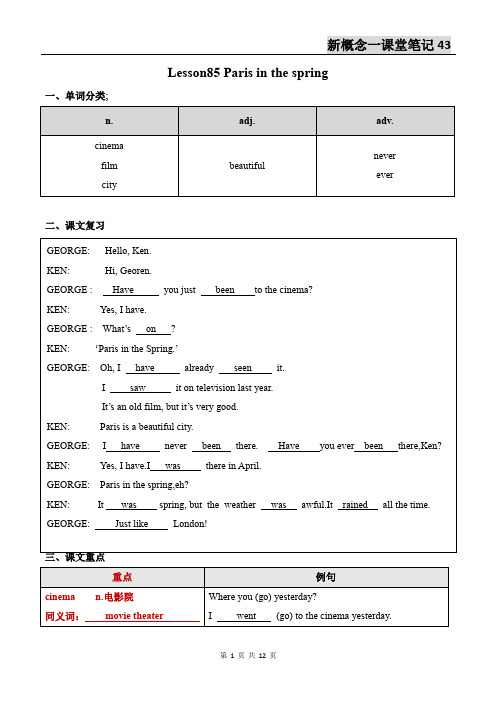
3. Mr. Wang has taught in this schoolforten years.
4.‘Have youeverseen the film?’
‘No, I haveneverseen it.’
5.‘Has the bus leftyet?
‘Yes, it hasjustleft.’
2.过去分词的规则变化:
ABB
原形
过去式
过去分词
原形
过去式
过去分词
通风
air
aired
aired
跳舞
dance
danced
danced
玩
play
played
played
购物
shop
shopped
shopped
变得
Thebeautywho wears abeautifuldress dancesbeautifully.
What abeautiful(beautiful, beautifully) castle!
Howbeautifully(beautiful, beautifully) those birds sing!
Where you (go) yesterday?
Iwent(go) to the cinema yesterday.
Ihave been(be) to the cinema only once.
I likegoing(go) to the cinemato see(see) movies.
How aboutgoing(go) to the movie theater?
Lesson85(课件)新概念英语第一册

GEORGE: Oh, I’ve already s_e_e_n_it. I _sa_w__it on television last year. It’s an old film, but it’s very good.
KEN: Paris is a beautiful city.
I ___ never ____ ____.
I’ve never been there.
____ you ____ ___ ____?
Have you ever been there?
Yes, I have. I ___ ____ in April.
Yes, I have. I was there in April.
Paris in the spring,eh?
It ___ spring, But the weather ___ ____.
It was spring, But the weather was awful.
It _____ _________.
It rained all the time.
It r_a_in_e_d_ all the time.
GEORGE: Just _lik_e_ London!
____ you just ____ __ the cinema?
Have you just been to the cinema?
Yes, I have.
What’s __?
What’s on?
GEORGE: I’ve neverb_e_e_n_ there. _H_a_ve_ you ever _b_e_en_ there, Ken?
新概念英语第一册Lesson85-86课件(共43页)解析
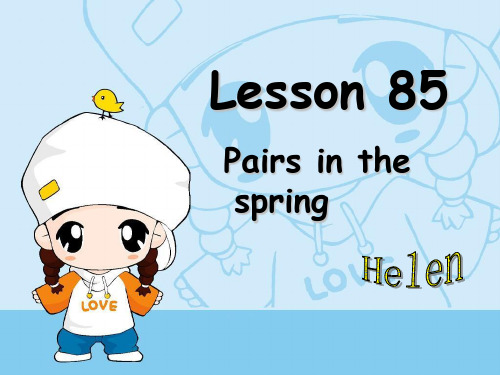
nerver & ever
never 决不, 从不
ever 曾经,永远,究竟
I will never forget your kindness. 我永远忘不了你的好意。
Have you ever been to Paris? 你去过巴黎吗?
活到老,学到老。
even been there,Ken?
KEN: Yes, I have.I _w_a_s__t_he_r_e in April.
GEORGE: Paris in the spring,eh?
KEN: It was spring, but the weather was aw
ful.It
rained
all
the
time.
GEORGE: __J_u_st__li_k_e_____ London!
三,词汇学习
英国妈妈是这样教宝贝说话的~~~
如果你是宝贝,能理解妈妈的话吗,能照妈 妈的话做吗?Hey, babe~~~
英国妈妈是这样教宝贝说话的~~~
Hey, babe~~~, try to write it down:
我们会被允许吗?
One is never too old to learn. Could we ever get permission?
GEORGE: Hello, Ken. just刚刚,刚才 KEN: Hi, George.
GEORGE: Have you just been to the
cinema?
Lesson 85 Paris in thespring
★ beNaeuwtifuwl oarddj.s漂a亮nd的expressions:
新概念英语第一册Lesson 85-86练习题(无答案)

新概念英语第一册Lesson 85-86练习题(无答案)3.I watched the film on TV last night.4.XXX't at home。
He has gone to school.5.e doesn't know much about Paris because he hasn't been there.6.Have you heard of Mr。
Li?7.It is raining all the time in April in Paris.8.In spring it rains a lot。
so the weather is awful.9.I have just found her XXX.10.The basket is empty。
Who has taken it?1.I can't see you these days。
Where are you?2.e has already seen the film.3.How about taking some photos?4.Have you ever visited the Summer Palace?5.When is she boiling the eggs?6.Has he done this homework yet?7.XXX has XXX.XXX is going to the city library。
He is going to be back at 6 o'clock.9.How long has he stayed in England?10.They have spent all their money。
so they have to walk home.1.I have never been to Paris before.2.Where is your father。
新概念英语第85-86课课文详解第一册

新概念英语第85-86课课文详解第一册新概念英语第85-86课课文详解(第一册)导语:巴黎是座美丽的城市,电影《巴黎之春》就是在那拍的,下面是一篇关于这方面的新概念英语课文,欢迎大家阅读。
Lesson 85 Paris in the spring巴黎之春Listen to the tape then answer this question.At what time of year did Ken visit Paris?听录音,然后回答问题。
肯是在什么季节访问巴黎的?George: Hello, Ken.乔治:你好,肯。
Ken: Hello, George.肯:你好,乔治。
George: Have you just been to the cinema?乔治:你刚去过电影院吗?Ken: Yes, I have.肯:是的,我刚去过。
George: What’s on?乔治:上映什么片子?Ken: “Paris in the Spring”.肯:《巴黎之春》。
George: Oh, I’ve already seen it.I saw it on television last year. It’s an old film, but it’s very good.乔治:噢,我已看过了。
我是去年在电视上看的。
这是老部片子,但很好。
Ken: Paris is a beautiful city.肯:巴黎是座美丽的城市。
George: I have never been there. Have you ever been there, Ken?乔治:我从未去过。
肯,你去过吗?Ken: Yes, I have. I was there in April.肯:是的,我去过。
4月份我在那儿。
George: Paris in the spring, eh?乔治:那是巴黎之春,是吗?Ken: It was spring, but the weather was awful. It rained all the time.肯:是春天,但天气太糟了。
2019新概念英语第一册Lesson-85Paris in the spring(共21张PPT)教育精品.ppt

中考链接
What has she done?
She has already cleaned her room.
She has already aired the room.
She has already opened the window.
She has painted a little bear.
The policewoman answered the phone.
ever adv.在任何时候 ever用于现在完成时的一般疑问句或者特殊疑问 句,表示曾经任何时候,也可以用于肯定句 Have ever seen a panda? No,I haven't seen a panda.
This is the best film I have ever see.
George:Paris in the Spring,eh? Ken:It was Spring.But the weather was awful.
Ken: Paris is a beautiful city. George: I have never been there.
Have you ever been there,Ken? Ken:Yes,I have.I was there in April.
never adv.从来不,绝不
经常用于现在完成时的否定句 汉译英: 你见过周杰伦吗?我从来没见过。 Have you met Jay Zhou? No,I have never met him. 你去过香港吗?我从来没去过。 Have you been to Hongkong? No,I have never been to Hongkong.
现在完成时
- 1、下载文档前请自行甄别文档内容的完整性,平台不提供额外的编辑、内容补充、找答案等附加服务。
- 2、"仅部分预览"的文档,不可在线预览部分如存在完整性等问题,可反馈申请退款(可完整预览的文档不适用该条件!)。
- 3、如文档侵犯您的权益,请联系客服反馈,我们会尽快为您处理(人工客服工作时间:9:00-18:30)。
Paris ['pæ ris] n.巴黎 cinema ['sinəmə] n.电影院 film [film] n. 电影 beautiful ['bju:tiful] adj. 漂亮的 city ['siti] n. 城市 never ['nevə] adv. 从来没有 ever ['evə] adv. 在任何时候
awful糟糕的, 讨人厌的
时态
用法
动词形式 时间状语 例句 标志词
一般现在 一般,经 原形/三单
时
常,习惯,am/is /are;
真理
dodoes
every day, always, usually, often,
sometimes,
I often read books.
He likes music
in spring / summer / autumn / winter 在季节前 不用加任何冠词‘Paris in the spring这指的是一个春 天在巴黎发生的事情,所以 加了定冠词
KEN: Paris is a beautiful city.
GEORGE: I've never been there.
Have they ever been to the space?
Has she ever been to an amusement park?
Miss Yang
Has he ever been to the …?
aquarium
aquarium
Has she ever been to the space museum
GEORGE: What's——o—n—? KEN: 'Paris in the spring'. GEORGE: Oh, I've already
seen it. I saw it on television last year. be on 是上演的意思, It's an old film, 也可理解成在荧幕上 but it's very good.
Has hewaetveerr pbeaernk to
the water park?
Make up a short conversation
Have you ever been to …? Yes , I have ./No , I haven’t. Has he /she ever been to …? Yes, he /she has./No,he /she hasn’t. Me, neither.
现在完成时 (1)在英语中,现在完成时表示过去发 生的事情对现在的影响。
(2)构成:have/has+ 过去分词,单 数第三人称用has,其他人称皆用have。 (3)一般现在完成时通常与表示不确定 的时间副词或短语连用如 just, already,
before, never, ever, twice, three
一般过去 过去发生
时
的事,不
强调对现
在的影响
过去式
yesterdayo, after---
I was there last month. I went to Paris last year.
现在完成 时
过去发生 have/has
的事对现 在的影响,
G/P:have /has been to have /has gone to
Homework
1.朗读背诵85课给家长听; 2.抄写85-86课单词每个1遍,翻译1遍,默1遍
完成课后86课课后练习; 3.听并默写第85课;
4.做力所能及的事,家长签字评语。
GEORGE: Pairs in the spring, eh?
KEN:
It was spring, but the weather
was awful. It rained all the time.
GEORGE: Just like London!
all the time 一直,始终
just是就,正好, 恰恰的意思。 like是像的意思
Have you ever been there, Ken?
KEN: Yes, I have. I was there in April.
in
April
月份前面不用冠词 never与ever都是完成时的标
志词,but never通常用于陈
述句中,表示绝不,从来没有,
而ever通常用于疑问句中,表
示曾经,在任何时候
Have you ever been to the bird nest?
Have you ever been to the disneyland?
Have you ever been to Xi’an Qinling Zooloigical Park?
Have you ever been to the Great Wall?
Lesson 86 What have you done?
written exercises A B
Summary
VOC:
Paris
n. 巴黎
cinema
n. 电影院
film
n. 电影;胶卷
beautiful adj. 漂亮的
city
n. 城市
never
adv. 从来没有
ever
adv. 在任何时候
+过去分词
或从过去
一直持续
到现在的
动作或状
态
already, just I have already (肯定句中); been to Paris. never(肯定句 I have just been 中表否定); there. ever(疑问句中) I have never
been there.
have
At what time of year did Ken visit Paris?
GEORGE: Hello, Ken. just刚刚,刚才 KEN: Hi, George.
GEORGE: Have you just been to the
cinema?
KEN:
Yes, I have.
have/has been to 去过已回 have/has gone to 去了未回
